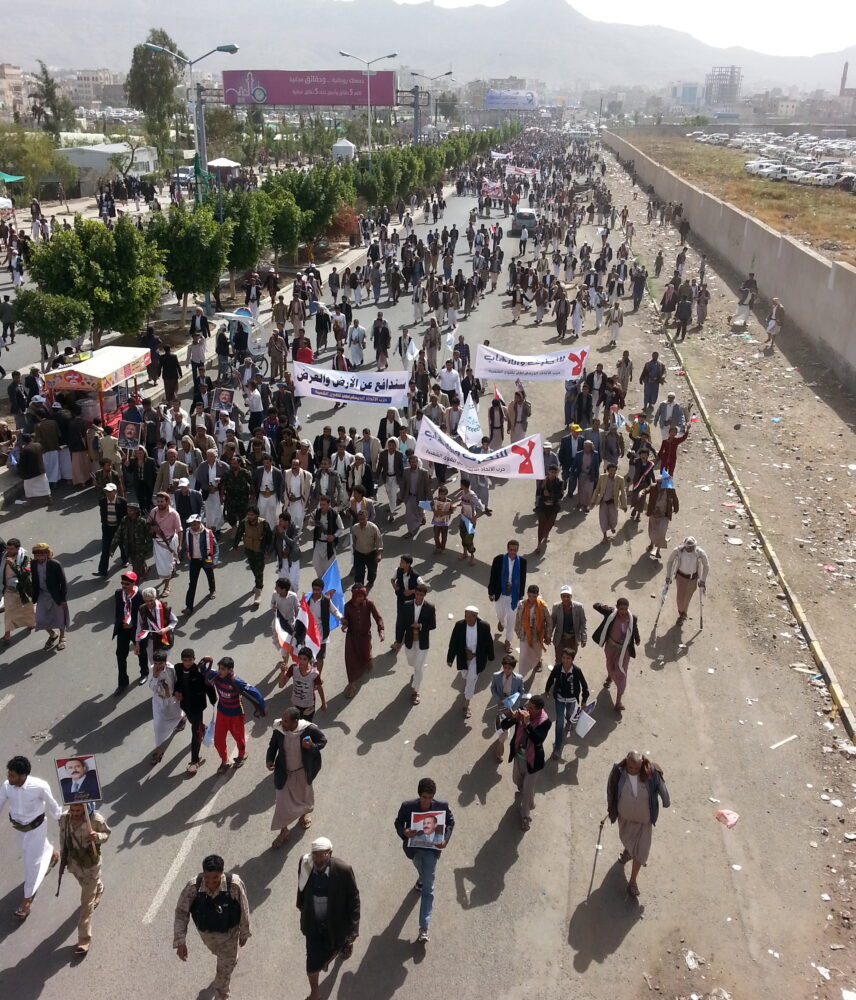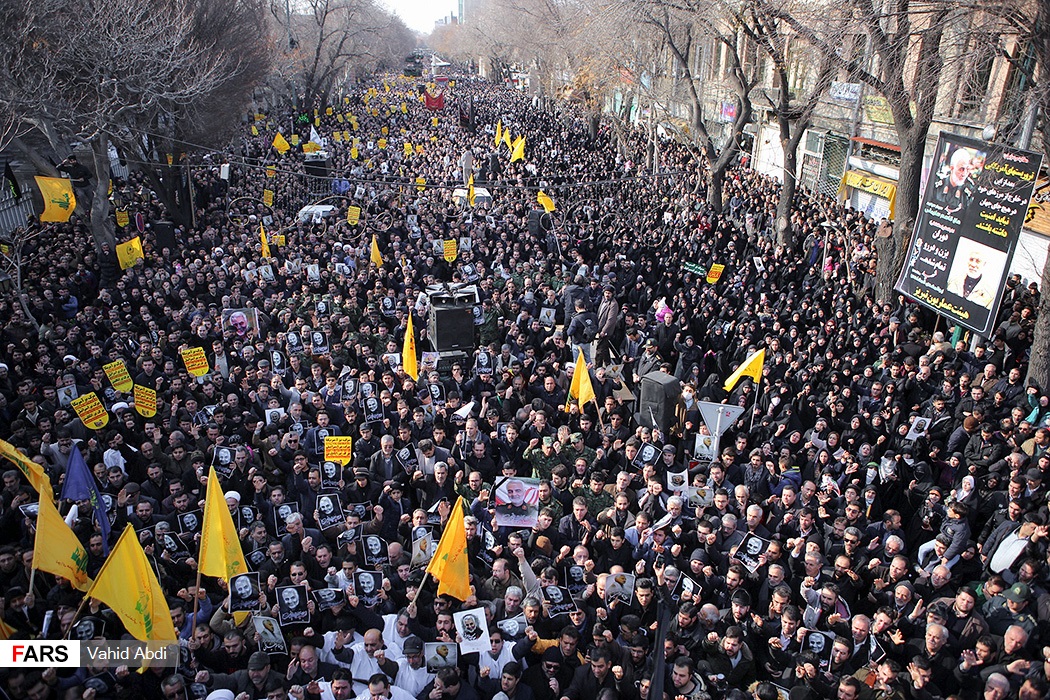The pandemic hasn’t spread a ceasefire, but prospects of a major regional war during Coronavirus appear slim, writes As`ad AbuKhalil.

Pedestrians in Shiraz, Iran, passing a closed market, March 2020. (Fars News Agency, CC BY 4.0, Wikimedia Commons)
By As`ad AbuKhalil
Special to Consortium News
 It would be normal in the age of Coronavirus to expect wars to be eclipsed by the global obsession with a horrific pandemic that refuses to go away. Yet, wars are still raging in many parts of the Middle East.
It would be normal in the age of Coronavirus to expect wars to be eclipsed by the global obsession with a horrific pandemic that refuses to go away. Yet, wars are still raging in many parts of the Middle East.
The Saudi regime (backed by the entire Western alliance) continues its brutal war on Yemen, while Libya’s civil war (triggered by President Barack Obama’s NATO “liberation” of the country) hasn’t abated — although the warring factions assured the Libyan people that their weapons have been sanitized.
In Syria, Israel continues to attack targets around the country, while the war between regime and armed opposition groups continues in and around Idlib. The U.S. and Russia have not diminished their intervention in Syria, and the U.S. seems to be working on entrenching its military presence in Iraq.
It rationalizes its presence there in the name of fighting ISIS while the real purpose is to fight Iranian influence in Iraq and beyond.

Protest in Sanaa, the capital city of Yemen, against the Saudi-led intervention, March 2016. (Fahd Sadi, CC BY 3.0, Wikimedia Commons)
In Palestine, Israel continues its traditional pattern of brutal occupation which includes —among other things — house demolitions, kidnappings, shooting, bombing and military incursions at any time.
But the fact that Coronavirus hasn’t extinguished the flames of war in the region does not mean that the region is destined to see an escalation of armed conflict. While conflicts rage and outside parties have not reduced their intervention, the prospects of a major regional war are rather slim, and for many reasons. The parties that are most likely to go to war are reluctant to escalate and expand existing wars although U.S. or Israeli miscalculations could trigger a major war at some point.
It is clear that Israel and the U.S. feel quite confident in their ability to intervene militarily in any part of the region without fear of retribution (although attacks on the U.S. embassy in Iraq have occurred). And while the Iraqi parliament voted to expel U.S. troops from Iraq, the U.S. has refused to leave and still insists that it needs to fight ISIS. Secretary of State Mike Pompeo simply “dismissed” the Iraqi vote.
Pretext of Fighting ISIS
The pretext of fighting ISIS has replaced the goal of combatting communism; the U.S. needs the concoction of a permanent threat to justify its global military presence and its military intervention around the world. (In Latin America, the pretext of “fighting drugs” has also been useful for U.S. military and intelligence operations).

U.S. Marines deploy to Iraq to bolster security at U.S. embassy, Dec. 31, 2019. (U.S. Marine Corps/Robert G. Gavaldon)
Similarly, Israel continues its attacks on Syria with scant attention from the U.S. press. Some Western media have repeated a claim in the last few years to the effect that Israel remained on the “sidelines” in the Syrian war even though evidence mounted of Israel arming some factions of the Syrian rebels.
Israel attacked Syria more than 200 times by 2018. And Israel has benefited from the unconditional indulgence of the Trump administration, but it is unlikely that it will go to war, especially during what is left of President Donald Trump’s first term. Israel has been bombing Iranian, Syrian, and Hizbullah targets in Syria but it may not reach the point of launching an all-out war.
Deterrents to Israeli Aggression
For one, the Israeli prime minister heads a precarious coalition of political opposites. His government partners will be suspicious if he triggers a war to divert attention from his legal woes.
Furthermore, since the July Israeli war in Lebanon and the successive recent Israeli wars on Gaza, Israel can no longer assume that it can launch and win a quick war. Those days are over. Ironically, it used to win quick wars against Arab armies but now bands of armed volunteers have forced it to reconsider its past strategy.

Israeli soldiers of the Nahal Brigade leaving Lebanon, Aug. 1, 2006. (IDF, CC BY-SA 3.0, Wikimedia Commons)
Thirdly, because Israel has lost much of its traditionally arrogant military self-confidence, it now assumes — rather rightly — that its Palestinian and Lebanese enemies will fight even better than in past wars and will deploy new tricks and methods against the Israeli army.
To be sure, the Israeli government enjoys unusually good relations with a number of Arab tyrants (in the Gulf and Egypt in particular) but any military confrontation pitting Israel against any Arab army or militia will compel those same tyrants to distance themselves from Israel.
Fourthly, wars — especially protracted wars like the 33 days of the Israeli war on Lebanon in 2006 — are costly and in the age of Coronavirus both Israeli and U.S. budgets are constrained. Traditional U.S. largesse may be limited by the pandemic, although Obama guaranteed Israel a whopping $38 billion over 10 years.
Saudi &UAE Less Restrained
The Saudi and UAE regimes seem less restrained than other actors in the region. The UAE continues its heavy involvement in the Libyan war, as does Turkey. And now the UAE has recruited the Egyptian tyrant Abdel Fattah al-Sisi, who has been threatening military intervention in Libya (and he just secured the authorization from his rubber-stamp parliament).
The UAE regards the Libyan civil war as an international war against the Muslim Brotherhood and its regional backers, namely Turkey and Qatar.
The Saudi regime failed to fulfill its promise of de-escalation in Yemen. And Western governments that promised tough sanctions on the Saudi regime for the murder of The Washington Post’s columnist Jamal Khashoggi seem to have forgotten about the crimes of Muhammad bin Salman.
MbS (as he is known) is incapable of pulling out of Yemen because the war on Yemen (which he dubbed “the storm of resolve”) has been his signature initiative in the region. The war was supposed to be a swift victory that elevated him to the status of a glorious Arab general.
US Constraints

President Donald Trump visits Ford Rawsonville Components Plant in Ypsilanti, Michigan, making ventilators. (White House, Wikimedia Commons)
The U.S. is less likely than even Israel to go to war. Trump has largely stuck to his promise of not starting new wars in the region, and while he tried to pull troops out of Afghanistan, Syria, and Iraq, the military and foreign policy Establishment have made it clear that there are certain parameters of behavior that even presidents are not allowed to violate, if the goal is the preservation and expansion of the American Empire.
To be sure, the U.S. has not ended its military intervention or its overt and covert operations against enemies of Israel and the U.S. in the region. But this is an election year and the Coronavirus strains on the budget make war unthinkable. The U.S. has not disentangled itself from the various wars started under previous Republican and Democratic administrations, from Afghanistan to Libya. The possibility of another war would alienate voters of both parties.
Iran, on the other hand, is suffering from crushing economic sanctions, which were made more acute with Coronavirus and the refusal of the U.S. government to relax some of the cruel sanctions to help the government deal with the medical emergency.
Iran Lacks Leadership Alternative
And the Iranian political elite is now grudgingly united behind the leadership of President Hassan Rouhani and Foreign Minister Mohammad-Javad Zarif, but only because of the lack of an alternative.

Demonstrations in Iran over the killing of Qassem Soleimani. (Fars News Agency, CC BY 4.0, Wikimedia Commons)
Rouhani-Zarif were elected on promises of getting the sanctions relaxed. Those dissipated with Trump’s decision to disregard the UN Security Council resolution on the Iran nuclear deal. And the weakness of Iran has increased the aggressiveness and provocations by the U.S. and Israel against it and its allies. It is this factor that could eventually lead to a regional war.
Israel has carte blanche from the U.S. to attack targets linked with Iran and its allies in Syria, and to engage in sabotage and terrorist attacks inside Iran. Israel has calculated that no matter how many provocations it commits against Iran, the latter will avoid military confrontation at all cost.
By killing Qasim Suleimani, one of Iran’s top commanders and Abu Mahdi al-Muhandis, a key leader of Hashd forces in Iraq, in Baghdad, the U.S. arrived at the same conclusion. But there is an undetermined threshold beyond which Iran can’t — for the survival of its regime and its political legitimacy and the legitimacy of its regional axis — tolerate U.S. and Israeli provocations. The threshold is something that AyatollahAli Khamenei will decide on, in close consultation with Hasan Nasrallah, the leader of Hizbullah, and the commanders of Iranian Revolutionary Guards. Israeli provocations have been increasing on the assumption that Iran won’t respond no matter. But the longer this goes on the more embarrassing this becomes for the Iranian regime—vis-à-vis its people and vis-à-vis the people of the region as a whole.
In sum, there are no prospects of peace in the Middle East, and Israeli intransigence has made even it difficult for its club of Arab tyrannical friends to reach peace agreements with it. But while regional conflicts and wars continue, the prospect of an all-out Middle East regional war seems quite remote, despite cumulative Israeli provocations which don’t seem to register in the record of Western governments and media.
As’ad AbuKhalil is a Lebanese-American professor of political science at California State University, Stanislaus. He is the author of the “Historical Dictionary of Lebanon” (1998), “Bin Laden, Islam and America’s New War on Terrorism (2002), and “The Battle for Saudi Arabia” (2004). He tweets as @asadabukhalil
The views expressed are solely those of the author and may or may not reflect those of Consortium News.
Please Contribute to Consortium
News on its 25th Anniversary
Donate securely with  PayPal here.
PayPal here.
Or securely by credit card or check by clicking the red button:

Second you on your view of pompous pompeo. But he comes from Kansas like Charles Koch whose stated aim was climate change so “Kansas could have two growing seasons”. Forget that climate change would kill or displace millions of other people, destroy cities, cause mass starvation.
Is there a translation to Arabic
Unfortunately we do not provide translations into other languages.
Israeli shenanigans continuing worries me as they will force countries next door to retaliate and then we will find ourselves involved to defend Israel. It’s a shame we don’t stop what Israel is doing to the Palestinians, so clearly needed that I shouldn’t have to say it.
Is Trump smart enough to avoid war? the biggest risk will be if he hijacks Iranian cargo ships heading for Venezuela. As you mentioned, Iran is aware that they will have to make a stand at some point and being passive in the face of piracy is a tough pill to swallow. The Trump Admin got that bizzare ruling in the U.S. courts authorizing asset seizure of Iranian ships. For a country like the U.S. which brags about how our Marine corp was birthed standing up to the Barbary Pirates, we sure do lack empathy for other countries in the same situation. I think the word that describes that is ‘sociopath’.
This is risk #1 and it’s all driven by U.S. aggression.
Outside chance of conflict w/China. Hey we fought them once before because we didn’t think they would ever fight us. We could push them too far as well. I’d like to think we are not that dumb but you never know. We are arrogant sociopaths who think that everyone else will always back down when we push them and are incapable of empathizing with their perspective.
Risk #2: nah, we can’t be that stupid.
“Risk #2: nah, we can’t be that stupid.”
I wouldn’t bet the farm on that Mr. Chuba …
I agree, rgl. We apparently are all too stupid. And Stupidity, as my late husband used to say, is deliberate, conscious ignorance, avoidance of facts that are contrary to our beliefs, worldview, conception of ourselves (in this case as a righteous and rightful imperial power, indeed THE imperial power bar none). Pompeo is, perhaps, the epitome of US (completely unwarranted) arrogance, hubris, self-righteousness, duplicity, greed (one look at him), immorality, inhumanity AND he, like all members of our ruling elites, clearly someone wittingly devoid of respect for any culture other than the one he calls his own.